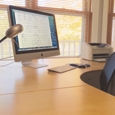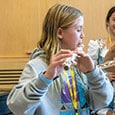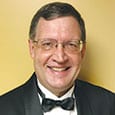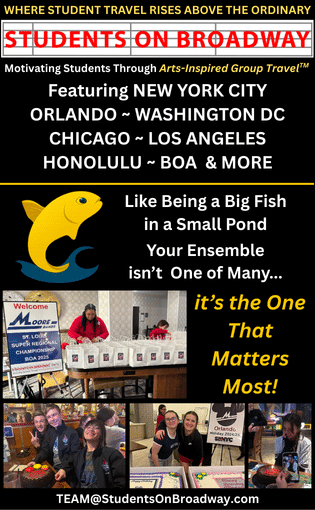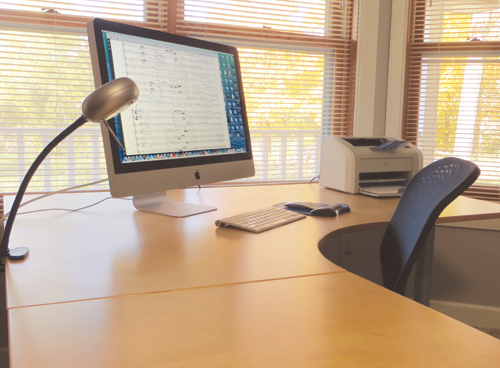
The Midwest Clinic began in 1946 as a small music reading session held in Chicago. Although the scope and influence of the convention has broadened, the performance of new music remains a central part of the Midwest mission. We asked several composers to talk about their works scheduled for performance this December. We wanted to find out how they work, where they find their inspiration, and how they started composing. We received so many thoughtful answers that we have broken up the article into two parts, with a second installment coming in December.
Aaron Perrine
How did you begin composing?
While I always had an interest in writing music, I didn’t really begin to compose until the beginning of my sophomore year in college. I entered college as a trumpet major, but at some point during my freshman year, my embouchure changed and I was forced to switch to the trombone. I felt inadequate for a time on both instruments, but my jazz band director asked me to write a chart for our jazz ensemble. Although this piece no longer exists – aside from the lone paper copy I recently removed from my undergraduate institution’s library – I learned so much about composing from this experience and was fortunate to have a director who was so willing to encourage and foster my compositional interests.
What was the best lesson you learned about composing?
Two things come to mind. First of all, write music you want to hear, rather than music you think others expect you to write. Secondly, because I often tend to agonize over every note, the most helpful thing I’ve learned about composing is to first focus on the big ideas – especially form and pacing – before refining all of the small details. This isn’t to say these small details aren’t important; on the contrary, these details are extremely important in separating one composer from the next. What I am saying, though, is work through the larger musical ideas first, to make sure you really have a piece of music that works.
What was the inspiration and development of the piece of yours being performed at Midwest?
The Buchholz High School Wind Symphony will be performing Pale Blue on Deep at Midwest. This piece was inspired by one of my many visits to Lake Superior. On this particular day, I was specifically drawn to the horizon; it was virtually impossible to tell where the water stopped and the sky began. More than anything, this piece is specifically based upon this idea of colors blurring into one another.
Do you have a set routine as you compose?
I wish; I’d probably compose a lot more music! In general, I tend to think quite a bit about a composition before I actually write a note. I almost always have to start at the beginning of a piece, even though I usually already have a pretty good idea of what kind of music is to follow. I like my music to feel organic, and I have a much more difficult time writing music that is meant to lead into something else. I often try to devote large chunks of time to writing, rather than write a little bit each day. It usually takes me a while to immerse myself in a piece, and many days I simply do not have the time.
I go back and forth between pencil and paper and the computer. I always sketch my ideas out on paper, but relatively quickly in the process, I begin to orchestrate at the computer (shown on previous page). I typically go straight to a full score, as I usually have a pretty good sense of the instrumentation and orchestration as I am sketching my ideas out on paper. I constantly revise my work while also pushing forward, so by the time I reach a double bar line, the music is fairly close to its finished form.
Who are your favorite composers and why?
This is an incredibly difficult question, and the answer seems to change by day! In general, I think I am most attracted to music that I can simply get lost in. I love to analyze music, but when I’m listening strictly for enjoyment, I want to feel personally connected, and hope to catch a glimpse into the composer’s soul (as cliché as that sounds!). A few composers that come to mind (in no particular order) are Michael Colgrass, John Luther Adams, David Maslanka, Maria Schneider, György Ligeti, Igor Stravinsky, and Johannes Brahms.
What is your approach to writer’s block?
When I’m stuck, the best thing I can do is go for a long walk. Often, the solution is there all along, and it usually presents itself while I’m away. With that said, sometimes you simply have to put in the time. I have many days where I am not happy with much of the music that I write. However, I also understand these days are a necessary part of the compositional process, and without them, I’d never actually finish anything!
What is the most embarrassing music that you love on your iPod?
I grew up playing a lot of rock with my friends, so you’ll always find a steady dose of music from the 80s and 90s in my collection. Additionally, I recently purchased Maria Schneider’s CD, Winter Morning Walks (featuring soprano Dawn Upshaw). It’s unapologetically beautiful music, and I love listening to it, as it always makes me think of home.

Born in McGregor, Minnesota, Aaron Perrine earned his bachelor’s degree in trombone performance and music education with high distinction from the University of Minnesota, Morris, in 2002. After his time in Morris, Perrine moved to Minneapolis and began working on his master’s degree. While at the University of Minnesota, he studied composition with Judith Zaimont and jazz arranging with Dean Sorenson. He completed his master’s degree in 2006, and is now pursuing his Ph.D. in composition from The University of Iowa, studying with David Gompper and Lawrence Fritts. One of his compositions, April, was a finalist in the first Frank Ticheli Composition Contest. His compositions for band can be found at C. Alan Publications. www.aaronperrine.com
Kari Zamora
How did you get started composing?
I actually started composing in my sophomore theory class at Hope College. We were working on the ideals of serialism and our assignment was to create a piano piece from a tone row. As serial music is not my favorite, I thought I would make fun of the process and make mine ridiculous. Ironically, it was exactly what my professor was looking for. As I captured the style of the piece, he let me go on to try my hand at impressionism and other styles while my classmates had to try again at the serial composition assignment. This really opened the door for me to see that composing was fun. I was always a good theory student, so understanding how the parts worked helped me understand composing more.
What is the best composing lesson you learned ?
Don’t force it. Walk away for a while if the ideas and melodies aren’t flowing and come back later in a day or in a few days.
What was the inspiration and development of the piece of yours being performed at Midwest?
I really loved one of the a capella choral arrangments of Give Me Jesus that our Hope College Chapel Choir performed when I was in college. I wanted to capture a similar feeling using strings. Many spirituals have been arranged for strings, but to my knowledge, no one had done Give Me Jesus yet. I love writing theme and variation forms so I used this for my Fantasia on an American Spiritual.
Do you have a set routine as you compose?
If I’m writing entirely new material, I usually start by singing my melodic material. If it is a great singable melody, I feel it is better material to work with. If I’m arranging or writing variations, I use both the piano and the violin to generate my variants.
Who are your favorite composers and why?
I love Vaughan Williams and Rachmaninoff the most. The way their pieces ebb and flow along with the gorgeous harmonic textures is my favorite.
What is a work of someone else’s that you think is underplayed and why?
Liadov’s Eight Russian Folk Songs. This is a great collection of pieces with so many moods and characters. It is on our prescribed music list, but most people I talk to have never heard of it. I loved playing it and loved conducting it last year with our full orchestra at Faubion Middle School.
What is the most embarrassing music that you love on your iPod?
Techno/electronica music – it’s just silly fun.
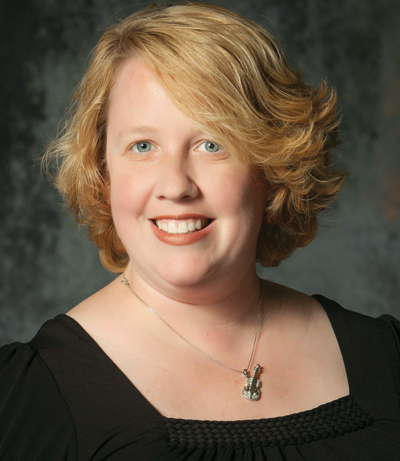
Kari Zamora is currently the head orchestra director at Faubion Middle School in McKinney, Texas. Zamora received a Bachelor of Music Education from Hope College in Holland, Michigan and received a Master of Music in Music Theory from the University of Florida. Zamora composes for middle school string orchestras. She has a passion for teaching strings as well as teaching practical theory skills.
Timothy Mahr
How did you get started composing?
During high school I was involved in arranging popular tunes of the day for our jazz and marching bands. It was fun (and illegal, I’m sure – what’s the statute of limitations on this kind of thing?), and I grew to enjoy hearing the scoring decisions I had made come alive. It was a natural leap to start coming up with my own material. I also wrote a lot of solo piano works at the time, hoping they might impress certain girls. I wish I could say I was successful with that venture.
What is the best composing lesson you learned?
It took years for me to listen to my inner voice and start composing what I was truly hearing versus writing what I thought others expected me to create.
What was the inspiration and development of the piece of yours being performed at Midwest?
When Michael Boitz approached me to create a work for the Saratoga High School Orchestra, we noted the large number of students in his program who were within a generation of an immigration experience. I thought about this for quite some time, reading about the Asian immigrant experience in California, looking for a specific spark for the work. It became evident that the work should speak about the issue with a broader stroke. Prayers in a New Land contains a variety of musical pleas, perhaps observational in tone, that are born of the immigrant experience, and which ask for salvation. Lives are changed during immigration and the consequences ripple forward in time through generations. This shared experience should unite us, not divide us.
Do you have a set routine as you compose?
Not particularly. I stay open to the initial concepts and triggers for musical ideas, and do quite a bit of improvisation at the piano, searching for those materials that seem right for the concept and hold promise for development. I work early in the morning and late at night; my day job as a professor and conductor at St. Olaf College naturally takes up the majority of my time.
Who are your favorite composers and why?
I’m influenced by many, especially those who were masterful orchestrators – Richard Strauss and Maurice Ravel come to mind instantly. Joseph Schwantner’s take on what a wind ensemble could do got to me at a very influential time in my life. I also greatly appreciate Ralph Vaughan Williams – I grew up in Wisconsin, so I’m not adverse to “staring at a cow for forty-five minutes,” which is how Stravinsky described an RVW symphony.
What is a work of someone else’s that you think is underplayed and why?
I’d say the Sinfonia in B Flat Minor by Amilcare Ponchielli. There is a modern edition out for this 19th century work, quite faithful to the original score, and it is just a gem. This is an original work for band by a master composer that is a fun challenge to perform and the audiences appreciate the work with enthusiasm. Most conductors don’t seem to know about it yet.
What is your approach to writer’s block?
Going for a walk, or a run if my knees will allow it. Driving alone in a car on a highway. Viewing art. Thinking about the problems right before falling asleep so that my dream state might be triggered to wrestle with the concerns. Things that help me tip over to the right side of the brain.
What is the most embarrassing music that you love on your iPod?
Some would say it would be the quantity of performances of my own works – it would seem rather narcissistic. I learn so much from listening to the efforts of others interpreting my music.
What is your most memorable premiere?
This will be my first premiere at the Midwest Clinic, but I’ve enjoyed numerous other performances of my works over the years. The most memorable was the United States Air Force Band presenting Into the Air! twice in one evening. Unforgettable.

Timothy Mahr is a professor of music at St. Olaf College in Northfield, Minnesota, where he is the conductor of the St. Olaf Band and teaches courses in composition, conducting and music education. Previous to his 1994 appointment at St. Olaf College, Mahr was director of bands at the University of Minnesota, Duluth, for ten years and taught instrumental music at Milaca High School (Minnesota) for three years. Mahr is well known as a composer and has over 50 works to his credit, many of which are published for band.
Brian Balmages
How did you get started composing?
My main path into composing stemmed from my career as a trumpet player. Growing up, I always enjoyed playing piano and would compose freely while playing, but I never wrote anything down. It was not until college that I started to notate my ideas on paper and began writing for performing groups of which I was a member. I really enjoyed the combination of composing and performing. I wound up writing for the college ensembles I played in as well as the Miami Symphony Orchestra (I played second trumpet in the orchestra for several years) and the Henry Mancini Institute Orchestra in Los Angeles. Ironically, that was a situation where the orchestra held auditions for anyone to be featured as a soloist in concert. They decided they liked the entire trumpet section and wanted to feature all five of us, but they could not find any music to perform. So I wrote a piece featuring the section and we had a chance to record it. Experiences like this pushed me into the world of composing more and more.
What is the best composing lesson you learned?
Get a performance or recording of everything you write. I can say that I have never written something that was not performed, sightread, or recorded. I have learned so much from hearing my music played by real people. I still recall writing for a trumpet ensemble I was playing in – there were moments where I absolutely despised what I wrote – the orchestration didn’t work, the voicing was all wrong – it just was not what I was hearing in my head. But other moments wound up sounding even better than what I heard in my head. I began to catalog all of these ideas – the bad ideas went into my “do not use” bag while the other ideas went immediately into my composer bag of tricks. That bag has gotten fuller over the years, and now I feel comfortable pushing boundaries even further.
What was the inspiration and development of the piece of yours being performed at Midwest?
At the time of this article, I am not yet fully aware of which pieces are being performed, so I will focus on a piece that will be premiered at the clinic. The piece is called Postcard from Miami and was commissioned by the Luis Piccinelli and the Coral Springs Middle School Jazz Band (yes, you read that correctly – jazz band!). I initially was reluctant to take the commission, but then found out it was intended to feature two dear friends of mine on flute – Erica Peel and Shivhan Dohse of In Sterio. Combine that with the fact that Luis also wanted to have Shelly Berg (Dean of the Miami Frost School of Music) on piano and Bryan Carter (drums) and the piece became tough to turn down. It is a first for me – combining my background as a classical trumpet player with my experiences writing for and playing in big bands. I am really excited about it, especially because it really pushed my boundaries as a composer and I grew a lot during the composing process.
Do you have a set routine as you compose?
I used to have the exact same routine regardless of the piece. Then I started to realize that each piece I write is different, and sometimes that necessitates that the compositional process is different as well. As a result, I now vary my approach depending on the piece. Sometimes I sketch the entire piece by hand. Other times I go straight to the computer. And yet others, I will just sit down at the piano for an hour or two and let ideas come and go until something starts to evolve.
Who are your favorite composers and why?
There are so many. I grew up listening to John Williams and greatly admire him. While his film scores are brilliant, I also have great respect for his ability to travel equally between the film score and classical music worlds. I am also a big fan of John Adams, Mahler, Stravinksy, and Ravel (to name just a few of many). These composers are all able to elicit an emotional reaction in me when I hear their music. They all show mastery of orchestration, harmony, melodic development, and more. I also admire how they never were content to be status quo. They all pushed musical boundaries, and Adams continues to do so.
What is your approach to writer’s block?
I find that a long walk outside can often help clear my mind. In other instances, I just need to get away from something for several days, which helps me approach the music from a fresh perspective when I come back. In both instances, I need to create space (physical and mental) between me and the music. Ideas often begin to evolve subconsciously, and I often have a renewed energy and enthusiasm for a piece when I come back to it after some time away. In other cases, I actually force myself through. I may not be proud of the music I write during that time, but it keeps me moving forward. Eventually, I find my way back on track (and sometimes even get to the end of a piece). At that point, I can revisit the section I am not happy with – often, it is easier to rework those passages when you know where the music is going.
What is the most embarrassing music that you love on your iPod?
Tough one. I have the entire Monster Ballads album on there. It brings back great memories of high school. Every time I hear “I’ll Never Let You Go” (Steelheart), I think about driving around in a Triumph Spitfire convertible on the way to hang out with friends, before I had any real responsibilities in life.
If you have had compositions premiered at the Midwest before, what is your most memorable premiere?
Ice Sculptures was premiered at the 2008 Clinic by the Bridle Path/Montgomery Elementary Select String Ensemble with Ralph Jackson conducting. It was my first Midwest premiere and was an extremely musical experience. It also marked the first time that I wrote for strings and piano where the piano took on an equal role. Everyone in the audience was stunned that a group of 5th and 6th graders could play so well. You could hear a pin drop in that room. It was magical.
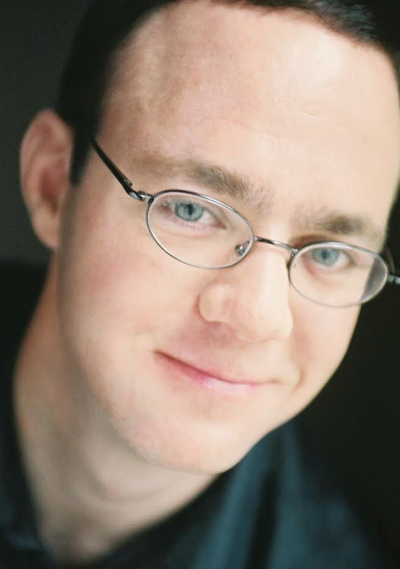
Brian Balmages is a composer, conductor, producer, and performer. He received a bachelor’s degree in music from James Madison University and a master’s degree from the University of Miami in Florida. Balmages’ compositions have been performed worldwide. He has also served as an adjunct professor of instrumental conducting and acting symphonic band director at Towson University in Maryland. Currently, he is Director of Instrumental Publications for The FJH Music Company Inc. in Fort Lauderdale, Florida.
Bob Buckley
How did you get started composing?
I’ve always loved music of all kinds. I wrote my first piece when I was eight, and when I was fourteen our upstairs neighbor (a composer) heard me bashing on the piano and offered to guide me. He lent me orchestral scores and recordings – it was the first time I’d heard Stravinsky or Bartok or Ravel – and I was hooked! I learned to compose from studying those scores and associating what I was seeing with what I was hearing. I started writing for the school concert band and jazz band, and I’ve never stopped.
What is the best lesson you learned about composing?
Each composition must have an overall vision – a music mode, a set of rhythms or a form – for instance. One piece that I wrote, Free Running, is made up entirely of staccato eighth notes. I try to stay away from formulas and not repeat myself – I try!
What was the inspiration and development of the piece of yours being performed at Midwest this year?
Postcard From England was inspired by a trek across the English countryside. There are public footpaths all over the country (some of them over private land). You come across rolling hills, pretty rivers, thatched cottages, stately homes, castles, and cathedrals. Everywhere I looked I heard music, and I started jotting down ideas. At first I had a chord progression – then came the melody.
Do you have a set composing routine?
I compose almost every day. I don’t compose at an instrument – I try to hear it all in my head and then I jot it down on score paper. Then I go to the piano to refine the idea, if necessary.
Who are your favorite composers?
There are way too many! The two that stand out to me are Stravinsky (The Firebird; The Rite of Spring) and Bartók (Concerto for Orchestra; Music for Strings, Percussion and Celeste; The Second Violin Concerto) – probably because they were my first awakening to orchestral music and they had such a huge influence on all the music that followed. I also love the music of John Williams, who never ceases to amaze me with the incredible variety and quality if his music.
What is your approach to writer’s block?
Answer 1: I like going for a walk, being in nature, going to an art gallery, being quiet – anyplace that I can find inspiration. I have to be willing not to think that every idea that I come up with is precious. Sometimes a great idea is on the heels of not such a good one.
Answer 2: A deadline!
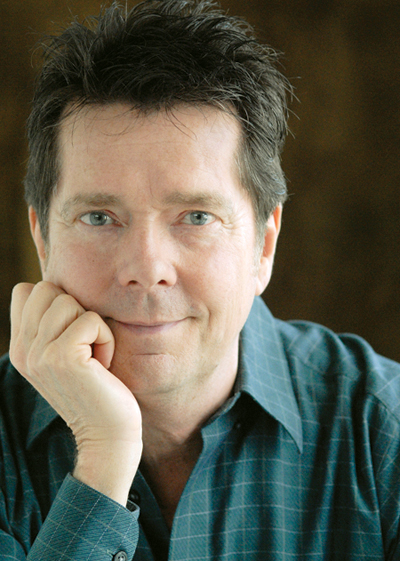
Bob Buckley is a composer, arranger, performer, producer, recording artist, and conductor. In the pop world, he has created several albums and hit songs with labels such as CBS and A&M. The number one single “Letting Go” earned him a gold record. He was composer-in-residence at the 37th annual Southeastern United States Concert Band Clinic at Troy University, Alabama where his composition Continuum was premiered. His concert music is published by Hal Leonard, Alfred Music Publishing, and C.L. Barnhouse Company.
